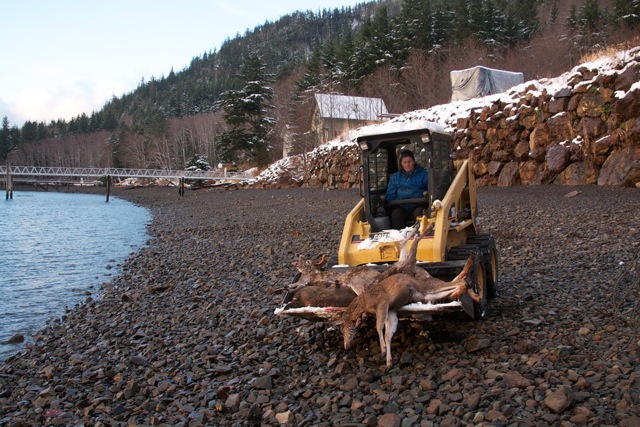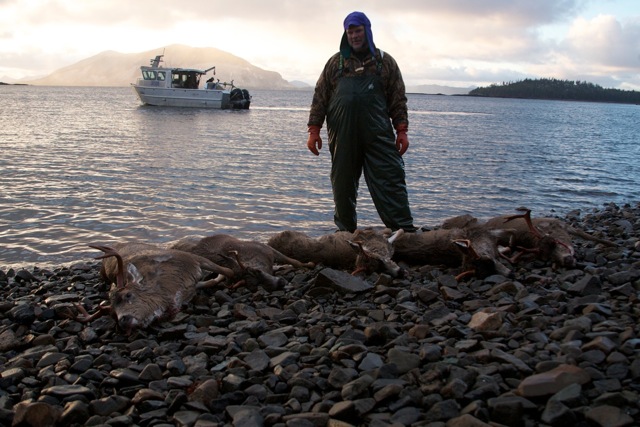Hi Everyone,
Mark sent me this photos after Thanksgiving, and I’m posting them now. Here’s the big guy in Craig, AK, during their Thanksgiving Holiday.
Maryann (Mark’s sister)


Hi Everyone,
Mark sent me this photos after Thanksgiving, and I’m posting them now. Here’s the big guy in Craig, AK, during their Thanksgiving Holiday.
Maryann (Mark’s sister)


Went to check traps today. Matt and I made 6 sets on Friday, 2 box/conibears per set so 12 traps out. I also tried strawberry jam as a second bait/attractor after reading others who had success. Makes sense, as marten eat berries.
The day started out in usual fashion. On the way to the ramp, my boat trailer practically disintegrated. One side of the back cross piece that has the two sets of rollers came clean off. I heard a scraping sound, and thought it odd as I couldn’t find the plow truck making it. Then I realized it might be me, so I got out, and surveyed the damage. At that point, with the weather fair and supposed to blow, I just got back in and scraped it right through Douglas to the ramp, launched the boat, and said I’d deal with it later.
At the first set, I knew it was gonna be a good day, regardless of the trailer. A double – and I saw 3 deer in on the beach, but of course, hunting season closed on Sat., so they are scot free now. The next 2 sets had nothing, but set number 4 had another double. Set 6 had a single with the other trap snapped. 5 for the day – equal to last year and year before’s total, so I’m getting the hang of it.
Flat calm, just about, except for the wind shipping out of Sheep Creek. It’s an interesting piece of water, as there may be only a 1 foot chop, but the wind can seem like it will roll you over if you let it.
Came back in a snow squall. Used the GPS to get across to Douglas Island shore, then around the corner and back to town.
I called around to find out about a new trailer, since this one seems to have about had it. Bolt holes are rusting through. When I got a quote that a new one was $2200, I thought twice, and headed to Western Auto and bought the new parts I needed. I used some cross bracing with pressure treated lumber scraps, and a couple hours later, went back to the ramp and got the boat.
I put the 5 marten in the freezer box with the other 4 and 2 mink, and was dog tired when I walked in the door. It’s Sara’s birthday today, to I better get something on for her for dinner. Halibut sounds good.
–
Mark Stopha
Alaska Wild Salmon Company
4455 N. Douglas Hwy
Juneau, AK 99801
www.GoodSalmon.com
Matt and I went out to reset my traps and try to get Matt a deer the last two days of the year, which is also the last 2 days of deer hunting season for us. On our second or third set, I was looking for a place to set when we saw a fiberglass cruiser off shore aways. We were looking for a good place that was deep right up to the beach so the tide wouldn’t go out too quickly if I was checking traps alone. Then we saw what we first thought was a punt being towed by the cruiser, then we saw someone paddling the punt. Matt finally saw a deer on the beach, and did we feel like dopes. Here they were trying to stalk a deer on the beach, and we probably sent the deer into the woods!
We then boated to the stern of the fiberglass boat and apologized to the skipper, who then realized we weren’t trying for their deer. He said there was a bigger deer than the one we saw that had already gone into the woods, and that was the deer the person in the punt was going after anyway.
We continued setting and saw a deer later on the same stretch of beach I’d seen 2 last time out. I put Matt in on the beach after the deer walked back into the woods, and left to make another marten set. When I came back, Matt said he crept into the woods and stood still for awhile trying to pick up the deer, and then he saw it running away and couldn’t catch up to it.
We finished setting traps, and had a couple hours of daylight, so tried to hunt a point. I went along the beach fringe and had Matt side hill about 100 yards up thinking the deer would likely be on the deer fringe, and any deer I moved would go to Matt. We didn’t see any deer, and started to circle back to the boat as the snow was coming down pretty hard, filling in all the older deer tracks. Then we cut a fresh track with no snow in it, and knew the deer must be near. We traveled through deep snow and brush trying to catch up, but never did see the deer. It did lead us back across the point to the beach, except when we came out we were pretty far from the boat. We humped it along the beach and glad the tide wasn’t higher or we’d have had to climb inland and over some cliffs had we been 30 minutes later.
We finally got back to the boat, and went to the cabin, sweaty and tired and feeling good about a some real exercise. We hunted north the next day but didn’t see any deer and came home. End of season. Not as good as last year for Matt, but never a “bad” one when you are out in the woods.
Another friend who went out earlier in the year was in his driveway when he heard a car slide and a thump. The car drove off as he came down to the highway, and there off the road lay a beautiful 3 point buck the vehicle had hit. The deer was still alive, so he grabbed his pistol and put the deer down, and was set for venison for awhile.
–
Mark Stopha
Alaska Wild Salmon Company
4455 N. Douglas Hwy
Juneau, AK 99801
www.GoodSalmon.com
We went to southern Southeast Alaska to Sara’s sister’s for Christmas. Wicked winds kept us inside. We attended a dinner each night at a friend or family’s home. Lots of fun.
I was supposed to leave on Monday, but the high winds kept the planes grounded and the ferry, which did go, was 2 hours late on a normally 3 hour run, and the ferry barely was able to dock in Ketchikan, from stories I heard. Had they not been able to dock, they may have had to return in the nightmare they just came through. I can’t imagine. Doesn’t sound safe that they went in the first place, paricularly with 99 mph gusts in Clarence Strait.
So on Monday, I spent the afternoon at fur handling school. My brother in law and his brother and I skinned 10 or so marten from their winter catch of some 90 or so for the season. I studied first how they did it, then dove in. They cut around the paws and did not keep the claws. A cut to the anus from either side, the strip the tail, and down the body. They used a clothes pin to strip the tail. I showed how I liked to use pliers, which gives a lot better grip with the long handles.
Then, they put the hide in corn meal, which helped to dry out the inside side of the pelt, and also made pulling off any remaining skin or fat much easier. We dredged the skin in the cornmeal, then worked off any excess skin/fat by hand. Then the hide was tacked fur side in on the stretching boards. They let them dry for just a few hours before turning to fur side out and tacking again – another lesson, as I let my dry for days, and then turned the fur out and did not retack.
Once the pelt was fully dry, they would fluff the fur with a vacuum, and “snap” the hide to make it its most fluffy. A friend of my brother in law who was watching said he used to wash raw marten fur (before putting on the stretcher) in Dawn soapy water to remove any pitch and make the fur shine. He also said a roe-stripping “gut hook” knife worked well for splitting the tail.
Lots of good ideas and practice for my own fur handling. I think making the fur as close to perfect as you can is respectful of the animals harvested and makes the most of the resource. I pulled my trapline before we went to Craig since I would not be able to check it for too many days. I can’t wait to get it back in.
As I sit here typing this back in Juneau, my brother in law called from his boat to say he, his daughter and her boyfriend were out for the day. They caught crab in the crab pots, shrimp in the shrimp pots, harvested on deer, towed a pile of logs home, and caught a king salmon on the tow home. Not a bad day.
–
Mark Stopha
Alaska Wild Salmon Company
4455 N. Douglas Hwy
Juneau, AK 99801
www.GoodSalmon.com
2 more marten today, and another trap snapped. Sara was along for the ride and to keep the boat off the beach while I ran into the woods. The ones I got also had the bait eaten behind the trap, so looks like there’s still more to come. Shed a tear having to pull the traps for Christmas break. One whale in Stephens Passage but only saw one other boat plus a tug and barge heading north.
Mark Stopha
Alaska Wild Salmon Company
4455 N. Douglas Hwy
Juneau, AK 99801
www.GoodSalmon.com
One marten and one mink. Again, another trap totally gone, and I did not find it this time. It was at a different spot than the earlier one. Lots of tracks on the beach with the new snow, so I know there’s fur around and exciting to see as I walked in to my sets. Saw two big deer between Pt. Young and Olivers on the beach. Could not put the sneak on. One looked nervous as I rode by. I pulled into the beach out of sight, and by the time I walked back to the spot they were gone. I tried calling up in the woods, but no luck. It was so crunchy I didn’t think I’d have much of a chance chasing them.
–
Mark Stopha
Alaska Wild Salmon Company
4455 N. Douglas Hwy
Juneau, AK 99801
www.GoodSalmon.com